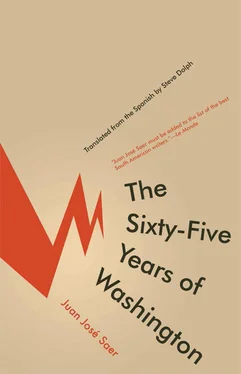A faint shadow passes, quickly, over Tomatis’s face. Without ever having thought about it, he knows that a request for a rereading is a veiled way of indicating that the effect the reader aimed for has not reached the listener, and that the listener, Leto, that is, no? to avoid praising what hasn’t affected him, uses the request for a rereading as a way to put off commenting, in order to prepare, during the rereading, a formulaic response that will satisfy Tomatis. But in truth Leto was not listening: during the reading, loose, disordered memories, practically without images or content, had plucked him from the October morning, pulling him back several months, to the time when, owing to Lopecito’s diligence and as a result of Isabel’s compulsion to escape, they had moved to the city. Leto senses, when Tomatis starts reading the poem a second time, his slight humiliation at the unjust judgment, and he senses, above all, while he puts on a much more attentive expression than his natural attention would call for, the gaze fixed on his face, from just above his head, by the Mathematician, who seems to have assumed, in solidarity with Tomatis, severe authority over the aesthetic effect that, peremptorily, the reading should have on him, authority that of course produces the opposite effect, as his excessive pressure on Leto becomes an element of distraction. Tomatis’s slow, pitched, monotone voice, slightly different from his natural voice, lays out the syllables, the words, the verses of the poem, constructing, with his artificial intonation, a sonorous fragment of paradoxical quality, as they say, no? belonging and at the same time not belonging to the physical universe — that’s it, physical, no? — which is, also, another name for that thing, the undulating material magma, so outwardly expansive, less apt to ritual than to drift, though the dreamy animal passing briefly through, suspect of his existence, insists on shipwrecking himself against it with blind, classificatory assaults. Austere or lapidary, Tomatis’s voice declaims: In another man devoured / my own death I don’t see / but plagued by geometric flowers / I waste away the hours / and now they keep vigil for me .
— Well-turned, Leto finally remarks.
— Do you have a copy? the Mathematician asks.
Tomatis hesitates a second, and then, aloof and ostentatious, gives the Mathematician the paper.
— Official exchange of press releases between the Chemical Engineering Students Association and Carlos Tomatis, he announces.
— A few more years and this is worth millions, says the Mathematician, dropping a reverent gaze at the typed out verses in the middle of the page, then putting it away after giving it a flamboyant kiss and carefully and easily folding it in fourths, following the folds Tomatis had made. And then he says, Should we walk a little?
— A few blocks, Tomatis agrees, reticently.
They start to walk, following the sun, and take up so much of the sidewalk that Leto, who is on the outside, is practically walking over the cable guardrail and every so often is forced to look over his shoulder to make sure that he isn’t about to be grazed by the slowly passing cars. Because Tomatis stayed between them, they form a declining group, from the Mathematician to Leto, not only in terms of their height and weight, but also their age, as Tomatis is a couple of years younger than the Mathematician and three or four older than Leto. But the pressure of the menace, which has surfaced again, distinguishes Tomatis from the other two, in his extremely pale color, his three-day-old beard, his stained and wrinkled clothes, but most of all with his shifty gaze, his ragged expression, the weak shivers of his body, the sudden, rough, and unpredictable movements of his head. Though they pretend not to, Leto and the Mathematician continue to notice it. And after walking a few meters in silence, the Mathematician, in a neutral and indirect way, asks what version he, Tomatis, who was present, can give of Washington’s birthday. Because they, Leto and the Mathematician, no? have Botón’s version, plagued with unverifiable interpretations, subjective assertions, and, he suspects, of anachronisms. He met Botón on the ferry the Saturday before and was just now telling Leto what Botón told him. Only when Tomatis doesn’t respond, merely shaking his head with restrained scorn, does the Mathematician ask, Is there a problem?
The words, Better that I keep my mouth shut , spill over the abject rim of Tomatis’s nervous lips and, proving the inconstancy of the signifying plane triumphant, continue without transition (and more or less): only more or less, Washington’s birthday was a convention of winos, thugs, and showgirls. For example, without going into it too much, Sadi and Miguel Ángel Podio, who present themselves as the vanguard of the working class, eject — at gunpoint — the members of the winning side the moment they lose a syndical election; he, Tomatis, can’t understand how they showed up that night without their bodyguards. And Botón, don’t start: he tried to rape Chichito at the back of the patio; she escaped thanks to her bourgeois reflexes and the fact that Botón was so drunk that not only could he not get it up but his legs barely kept him upright. And the proof that he was drunk is supplied by the fact of having picked Chichito, who is beyond the reach of anyone who hasn’t passed through the National Guard, when there were two or three women present who would gladly have taken a turn around the patio and were frivolous enough that even Botón would have seemed interesting company — they say that Nidia Basso, for example, is a nymphomaniac, and he has heard that Rosario, Pirulo’s wife, who works as a nurse in a clinic, likes to bleed herself with a syringe every once in a while. Hadn’t they seen how pale she was?
Over Tomatis’s head, thrown forward by the force of his disquisitions, Leto and the Mathematician exchange a quick and puzzled look that they use to seal, in that emergency situation, a pact in which their momentary exchange assumes the following precepts as given: 1) this morning, Tomatis seems to be in a special state of mind, 2) their efforts to bring him back to a relatively normalized relational system have up to this point failed, 3) the special state of mind this morning is making Tomatis describe the events surrounding Washington’s birthday in a distorted way, flagrantly resorting to caricature and even to slander in his references to the events, and 4) the parties are mutually impelled, via the present pact, to take Tomatis’s version with a grain of salt. Yes , thinks Leto, who still has some pangs of loyalty to Tomatis, and turns his head: But where there’s smoke there’s fire . The Mathematician, meanwhile: It’s impossible for him not to react . And Tomatis, under the cascade of malevolent words he would like to stop but which the pressure of the menace forces out:. . the universe is going to. . is going to. . and I’m going to. . Ultimately, in short, and once again, though it’s always the Same, as I was saying just now, every thing.
Oblivious to the pact just made over his head and unable to perceive any show of reproach or skepticism or discomfort in the discreet and somewhat embarrassed silence that meets his words, Tomatis continues: to top it off, after dinner, sometime around midnight, Héctor and Elisa, who are constantly brawling, passed out, as did Rita Fonesca, the painter who Botón, among others, makes time with, and who tries to show everyone her tits when she’s drunk. And finally, at four in the morning, Gabriel Giménez had come, not having slept for three nights and trying at all cost to get Washington to snort a little packet of coke. The taxi waiting for him at the entrance, according to Tomatis, had been hired the morning before.
Читать дальше












